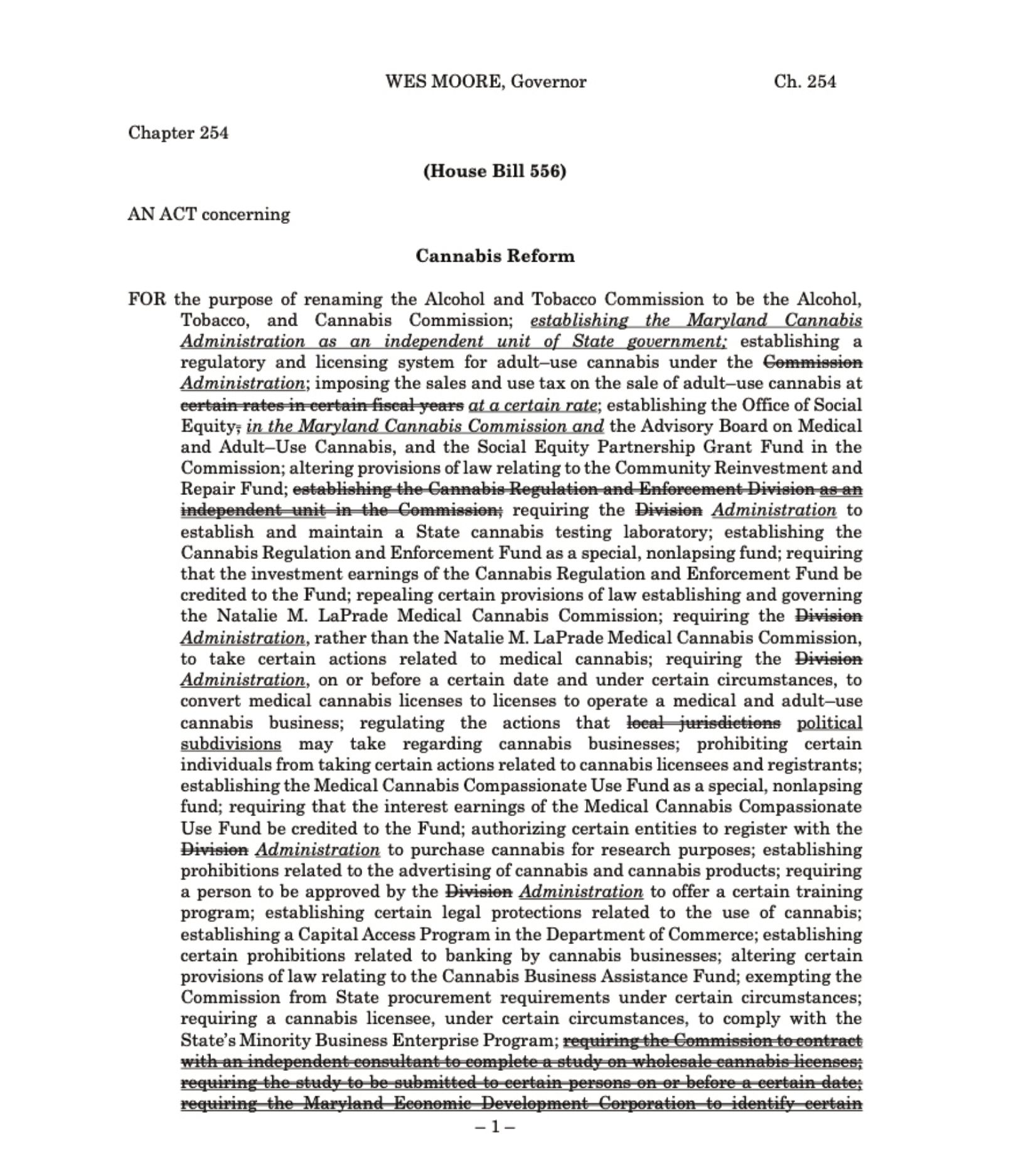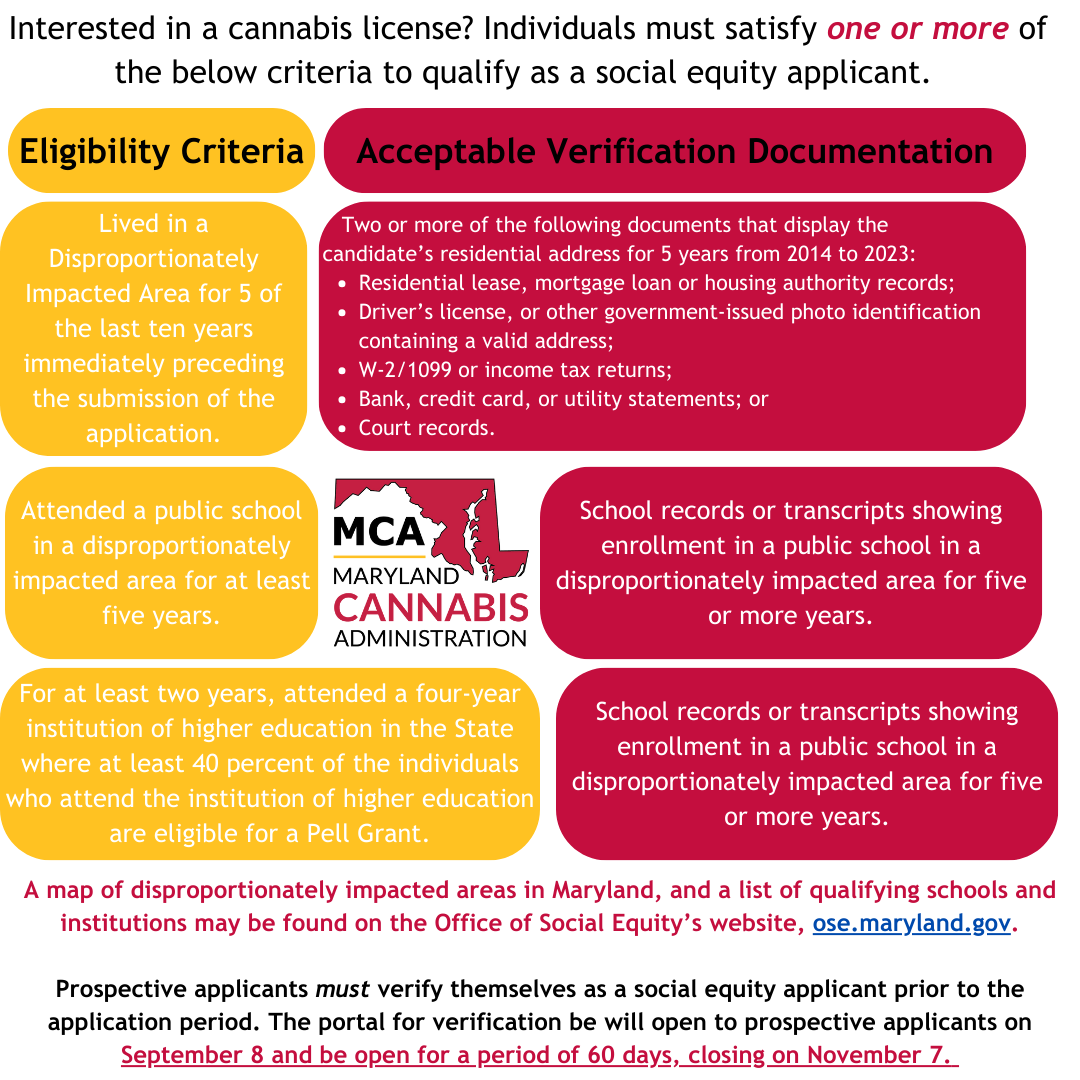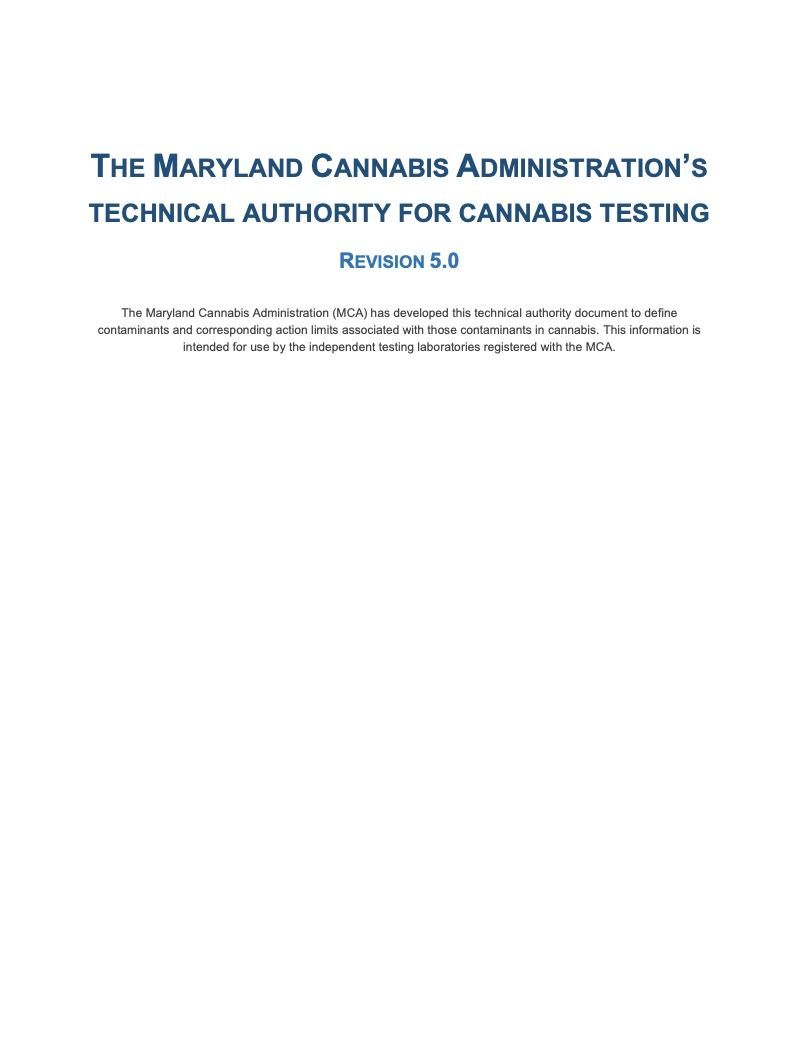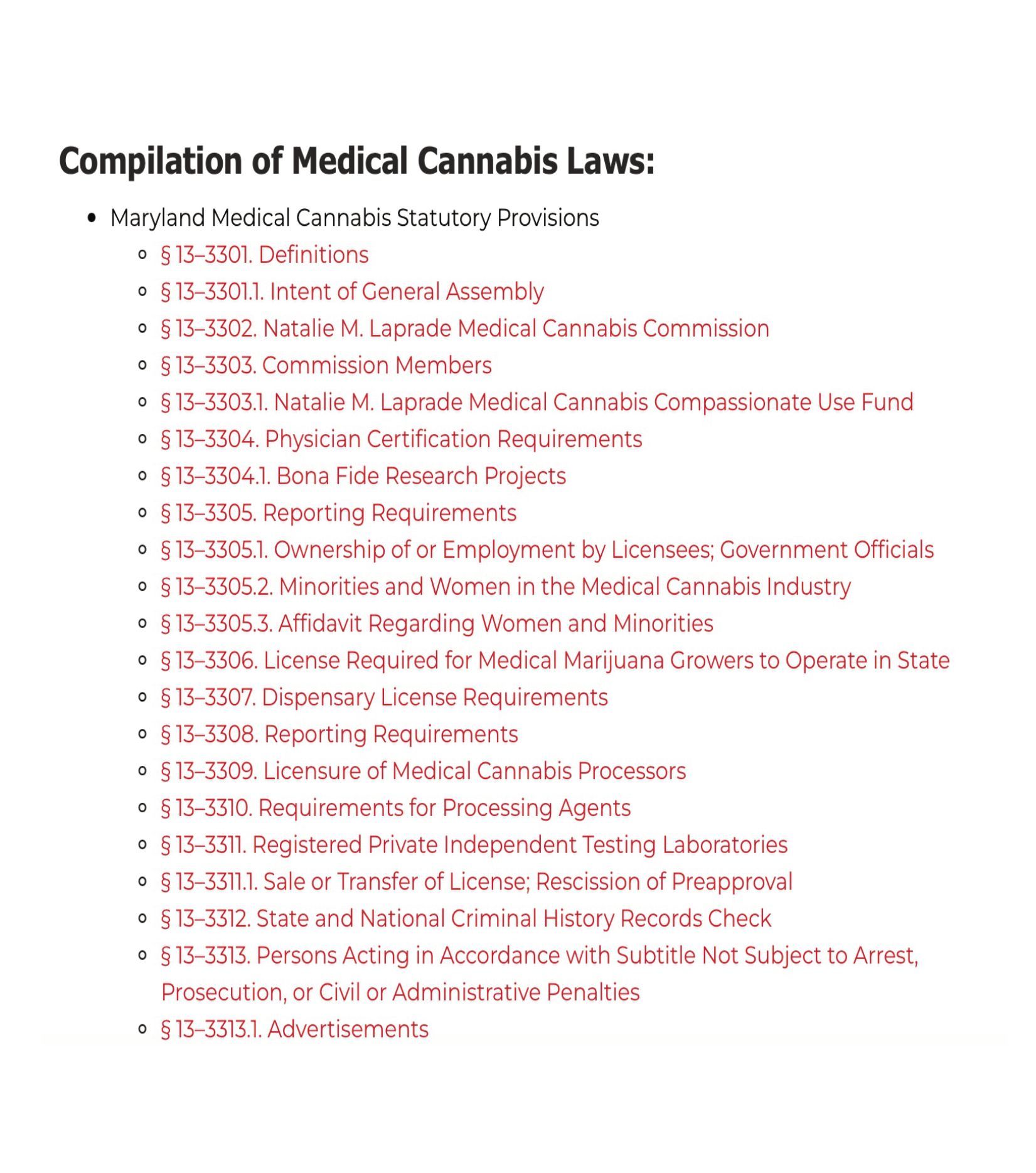About Cannabis
Legal Status of Cannabis
Adult Use Cannabis was legalized in Maryland on July 1, 2023 for individuals 21 or older. As of April 2023, 21 states and the District of Columbia allow adult use cannabis.
Medical Cannabis was legalized in Maryland in 2013, and as of April 2023, medical cannabis is legal in 39 states and the District of Columbia. Maryland's Medical Cannabis Program will continue under adult use cannabis.
FAQs on Adult Use Cannabis
For Consumers and Patients
-
What cannabis products can I purchase?
Adult consumers may purchase flower, vapes, tinctures, edibles, tablets, capsules and topical products. High Potency cannabis products may not be sold to adult consumers. Products that exceed 10 mg THC per serving or 100 mg THC per package may only be sold to a qualifying patient or caregiver.
Cannabis Concentrates, including kief, hashish, bubble, hash, oil, wax, shatter, resin, infused joints or pre-rolls are restricted to qualifying patients and may not be sold to adult consumers.
-
When and how can I buy adult use cannabis products?
The legalization of adult use cannabis for individuals 21 or older began on July 1, 2023. Individuals must present a government-issued ID to purchase cannabis or cannabis products from a licensed dispensary.
Find list of those licensed dispensaries here.
-
How much cannabis can individuals 21 or older possess?
Individuals can possess up to 1.5 ounces of cannabis flower, up to 12 grams of concentrated cannabis; or a total amount of cannabis products that does not exceed 750 mg of THC.
-
Does the legalization of adult use cannabis impact the medical cannabis program?
No, not directly. Individuals 18 or older can continue to register for the medical cannabis program and buy medical cannabis products from licensed dispensaries. The law passed by the Maryland General Assembly mandates several accommodations, like patient-only operating hours and confirmed product availability, to ensure registered patients can access necessary medication. Additionally, medical patients do not pay the sales tax for cannabis medication.
-
What funds were created by the passed ballot referendum?
- Public Health Fund - addressing health effects related to adult use cannabis
- Business Assistance Fund - encouraging and increasing participation of small, minority and women-owned businesses in the cannabis industry
- Community Reinvestment and Repair Fund - providing monetary support to communities disproportionately impacted by cannabis prohibition and enforcement
For Prospective Growers and Processors
-
How can I become a grower or processor in Maryland’s adult use cannabis industry?
Interested parties will need to apply for licensure with the Maryland Cannabis Administration. The first round of applicants must qualify as social equity applicants to be considered. The qualifications for social equity applicants can be found here.
-
Who qualifies as a social equity applicant?
An applicant with at least 65% ownership and control held by one or more individuals who meets one or more of the below qualifications:
- Lived in a disproportionately impacted area for at least 5 of the past 10 years;
- Attended a public school in a disproportionately impacted area for at least 5 years;
- Attended, for at least 2 years, a 4-year institution of higher education in the State where at least 40% of the individuals who attended the institution are eligible for a Pell grant
-
I qualify as a social equity applicant. What do I need to submit to apply?
The application must include a detailed operational plan, a business plan and a detailed diversity plan. MCA approved templates can be found below.
There is an application fee of $5,000 for a standard license and $1,000 for a micro license. Prospective applicants must verify themselves as social equity applicants between September 8 - November 7. Learn more here.
-
I am ready to apply. When can I submit my application?
The application period for the first round of adult-use cannabis business licenses will be open from November 13 - December 12. Applicants will be submitted via the Maryland OneStop portal.
Learn more about key dates of interest, social equity verification, and number of licenses available here.
-
How will my application be evaluated?
The MCA will review applications based on the minimum requirements established on their Evaluation Worksheet.
Can medical cannabis help you?
Medical cannabis is an effective treatment for many conditions as prescribed by your doctor or medical provider. In order to qualify, you need to obtain a written certification from a provider registered with the Maryland Cannabis Administration (MCA), register as a patient with MCA, purchase your MCA ID card and then visit a licensed Maryland dispensary.
FAQs on Medical Cannabis
-
What is the benefit of having a medical cannabis card if Adult Use cannabis is legal in Maryland?
Medical cannabis patients have access to a wide variety of cannabis products made specifically for medical needs. Additionally, medical patients do not pay the sales tax for cannabis medication.
-
What conditions qualify me for registration?
To participate in the Maryland medical cannabis program, you must be diagnosed with one of the following conditions: cachexia, anorexia, wasting syndrome, severe or chronic pain, severe nausea, seizures, severe or persistent muscle spasms, glaucoma, post-traumatic stress disorder (PTSD), or another chronic medical condition which is severe and for which other treatments have been ineffective.
-
Who is able to obtain medical cannabis?
Any Maryland resident who is over 18 and has a provider who recommends medical cannabis as a treatment for a qualifying medical condition is eligible to obtain cannabis once registered.
-
What is required to register?
You will need an electronic copy of U.S. government-issued ID (front and back), proof of having a Maryland address, and an electronic copy of a clear photograph taken within the last six (6) months.
-
What is the age to register for a medical cannabis card?
Registrants must be at least 18 years of age. If under 18, the consent of a caregiver or legal guardian is mandatory.
-
Are there any registration fees?
Patients pay $25 at time of registration.
-
How long is the waiting period from registration to being able to purchase medical cannabis?
After the provider has examined the patient and the patient’s records, the provider may issue the patient a certification immediately.
-
Once I am registered, where can I purchase medical cannabis?
A Maryland patient can only obtain legal medical cannabis from a Maryland-licensed dispensary. Once you’ve received your patient registration card, click here to find a dispensary.
-
Do I have to inform my workplace of my registration?
There is no legal requirement to inform your workplace you are a medical cannabis patient. However, Maryland law does not prevent an employer from testing for use of cannabis (for any reason) or taking action against an employee who tests positive for use of cannabis (for any reason).
-
Does being a medical cannabis patient go on any public records or is it confidential?
Decisions made between you and your doctor are private and confidential.
-
What doctors can I see to prescribe medical cannabis?
You may obtain a prescription for medical cannabis from a registered cannabis provider. Providers can be found here.
-
Will my health insurance cover medical cannabis?
Generally, no.
-
What if I am receiving treatment in Maryland, but I don’t live in Maryland?
Non-Maryland residents qualify for registration if the individual is physically in the state and admitted to a Joint Commission accredited medical facility, or will be dispensed medical cannabis at the medical facility during an inpatient stay.
Maryland Medical Cannabis Laws and Regulations
-
Compilation of Medical Cannabis Laws
Button
Benefits of Cannabis
Cannabis contains active chemicals called cannabinoids that cause drug-like effects throughout the body, including the central nervous system and the immune system. Cannabis can be effective in treating medical conditions and managing pain. It may be helpful in treating certain forms of epilepsy, nausea and vomiting associated with cancer chemotherapy, and loss of appetite and weight loss associated with HIV/AIDS. In addition, some evidence suggests benefits of cannabis for those with chronic pain and multiple sclerosis.
Because cannabinoids affect physical and mental processes, and may not produce the adverse effects of prescription drugs, some people have found success in reducing dependency and addiction to prescription medications with the use of cannabis.
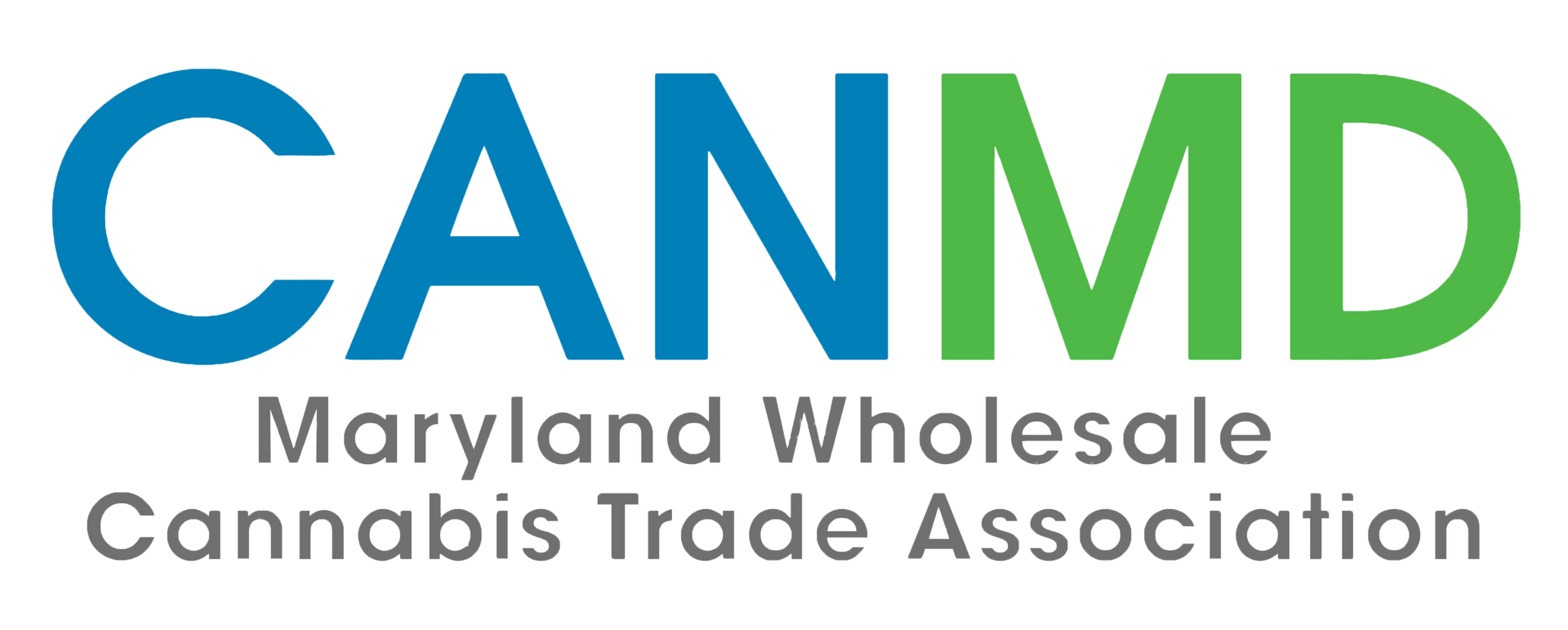
Website powered by Neon One | ©2023 All Rights Reserved | Maryland Wholesale Cannabis Trade Association
